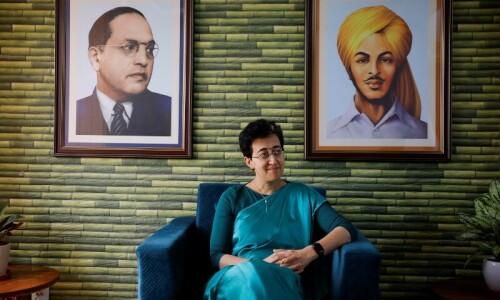TOKYO: A rebuke of Japanese Prime Minister Taro Aso by popular former leader Junichiro Koizumi could speed up moves to dump the premier ahead of an election, but even that might not save the ruling party from defeat at the polls.
Koizumi, a wavy-haired, media-savvy maverick who led the conservative Liberal Democratic Party to a huge election victory in 2005, publicly blasted the embattled Aso recently for rejecting reforms at the core of his policy platform.
He also questioned whether Aso could lead the LDP to victory in a lower house election this year.
Aso’s public support rates have slid to as low as 14 per cent after a series of policy flip-flops and gaffes at a time when Japan is sliding further into recession. This week he came under fire for saying he had opposed privatising Japan’s huge postal system, the flagship of Koizumi’s reforms.
“Lots of LDP people who are unhappy under Aso will find a good excuse now that Koizumi said what they think. It’s pretty hard to avoid getting into a crisis situation for Aso,” said Sophia University political science professor Koichi Nakano.
Recent surveys suggest the main opposition Democratic Party of Japan (DPJ) stands a good chance of winning the election, which must be held no later than October.
That would end more than 50 years of almost unbroken LDP rule and usher in a government pledged to break the grip bureaucrats have on policy and reduce social gaps that critics say widened because of Koizumi’s reforms. Koizumi, 67, who has said he would not run in the next election and has tapped his son to stand for his parliament seat, is unlikely to stage a comeback, analysts said, although some cautioned that the former leader was always unpredictable.
But he could back a pro-reform candidate to replace Aso such as Yuriko Koike, 56, a former defence minister who last year became the first woman to run in an LDP leadership race.
Koike, who lacks a broad base in the party, came a distant third to Aso.
Post-budget coup?
“This reinforces the view that Aso is a lost cause, so after the (2009/10) budget is enacted, the LDP might hold a leadership race in early May and then dissolve the lower house for a June election,” said political commentator Hirotaka Futatsuki.
The national budget for 2009/10 from April 1 is now being debated in the lower house.
“Koizumi is unlikely to run but even without a seat in parliament, he has influence and could use it to back Koike,” said Futatsuki.
Aso is Japan’s third prime minister since Koizumi stepped down in 2006 after more than five years in office.
Both of Aso’s predecessors quit abruptly in the face of a deadlock caused by a divided parliament, where the opposition controls the upper house and can delay legislation, including bills needed to implement spending.
Koizumi also raised eyebrows by saying he was opposed to the ruling bloc using its lower house majority to enact legislation to implement an unpopular plan to distribute two trillion yens ($22 billion) in payouts to individuals to stimulate the economy.
If 16 ruling party lawmakers were to vote against the legislation, it would fail to pass, sparking a crisis for Aso that could force him to step down or call an election.
Former LDP secretary-general Koichi Kato, himself a possible defector but no fan of Koizumi’s reforms, said party leaders agreed that economic steps were the top priority.
“There is a feeling in the party that antibiotics need to be administered to bring down the fever and pass the budget,” Kato told reporters. “But once the budget is passed, watch out.”
Legislation to implement the payout plan is stuck in the opposition controlled upper house, and in a sign that the opposition was eyeing possible LDP defectors, a Democratic Party executive said the chamber would wait until Koizumi returned from a trip to Moscow on Feb 20 before voting down the bill.
Despite the furore, some analysts said Aso could hang onto his job by threatening to call an early election that the party would likely lose if held soon.
Nor would all LDP critics of Aso be willing to coalesce around Koike or another pro-reform candidate, said Rei Shiratori, president of the Institute for Political Studies in Japan.
The LDP has drifted away from Koizumi-style reforms under Aso while the Democrats have adopted a populist tone stressing the need to shrink income gaps and strengthen social safety nets.
“If Koizumi were to come back, everyone would say, ‘We are suffering from your policies and that is why there are such big social disparities’,” Shiratori said.—Reuters














































Dear visitor, the comments section is undergoing an overhaul and will return soon.